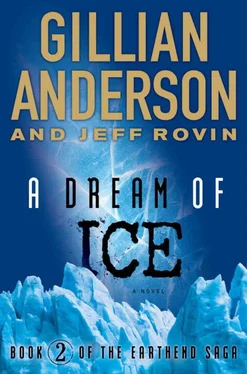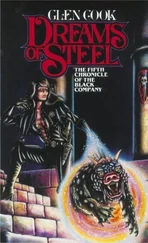Mikel had not been convinced. For him, the sensation had remained in the room for days after. Now he knew the truth: she had been wrong. The previous “recording” offered up by the tiles had shown living people. This one showed a soul, a ghost, a poltergeist, whatever label one wanted to attach to it.
This man and his colleagues believed in souls , Mikel told himself. They tried to bond them, to unify, to rise to some other plane. Had they succeeded? Had this one intentionally remained behind?
Or is that the fate of a soul that did not bond? he wondered.
Argh! To be so close yet unable to communicate with this man , he thought. To not to have the chance to study the room personally—
“Talk to me!” Mikel yelled.
The figure went about his wraithlike business. With a frustrated cry, Mikel drove the side of his fist into the tile. The image jumped ahead. Now there were two specters in the chamber: Pao and another, an aged woman.
“All right,” Mikel said to the tile. “Why did you stop here?”
There didn’t seem to be anything exceptional about the moment. Had the projection jumped to this spot because there was some kind of bookmark ? Then, suddenly, Mikel realized something that sent a jolt through his belly. Or—
Is it real? Is this happening now?
His chest felt heavy under the weight of the thought even as his heart and mind raced.
He hit the tile again. The image did not change. That could only mean that this was no longer an image. Was he watching figures who were present now , behind the tiles. Were the stones relaying activity that was taking place behind them: the actions of spirits in the present day who had been here, he surmised, for untold millennia. He recognized one as Pao, the other was in shadows, barely visible.
As his eyes adjusted to the scene he saw more that confirmed his assessment. There were skeletons on the floor, close to one another. The bones had crumbled almost completely away, but Mikel could still make out the supraorbital ridge of a skull defining the hollow of an eye, and the arch of a pelvis. He felt the cold shock of realization. The skeletal remains belonged to these two souls.
Looking closer, he saw that the spirits were moving among scrolls and piles of stones with markings that appeared to shift and move, like animated drawings. Each time they did, Mikel noticed a barely perceptible flicker among the tiles before him: here and there a glow brightened slightly, as if they were acknowledging—or recording?—the change. That did, after all, appear to be their function.
The two spirits were speaking. Though Mikel was still trying to understand the mechanism by which living spirits were visible to him, the words they spoke were clear and comprehensible. Pao paused to look at a petroglyph.
“We cannot afford to spend more time,” he said.
“We cannot afford to leave,” said the other—a woman, bent and small, her voice low and grave. It took Mikel a moment to realize that this was Rensat, the woman who had seemed much closer to Vol in the last “vision.”
This Pao, too, was much older than he’d been in the chamber. The beard was still lush but age had whitened it even more. His face was etched with deep lines and his voice cracked.
Suddenly Rensat moved from the shadows.
“I will not go without knowing what happened to Vol,” she said. “And we still have work to do, a traitor to locate.”
“And… a mysterious savior, perhaps,” Pao said, more resigned than hopeful. He turned back to the stones moving again from one petroglyph to another.
But something else was different, something more than just the jump forward in time. The air around Mikel himself felt hollow, like the low-pressure system created by an approaching storm. Someone, some thing , was also present in his time, in the chamber. He wanted to look around but he did not want to take his eyes from the living history. The only experience Mikel could compare it to was the séance, the way the atmosphere in the room had shifted: it felt empty of life, even their own, yet full of something else.
Mikel pulled off his mask, took a deep breath, unzipped a pocket, and stowed the mask inside. He hesitated, preparing himself for the onrush of that feeling again before placing his hands on either side of the tiles. His fingers fidgeted, until he realized there was something for them to fidget with. The bank of tiles was loose. With a quick push and pull, the tiles came off as one whole section in his hands. It didn’t feel accidental. The panel was designed to be removed, and there were tiles around the back as well.
He looked again at the projection of the room. The two people inside seemed suddenly uneasy.
“What was that?” Rensat asked.
“I don’t know,” Pao said. “But we must go. It is time.”
Rensat shook her head and returned to her work. With a glance toward Mikel—and eyes that appeared to be searching, seeking—Pao sighed and then also resumed his studies.
What are you looking for… still, after all these eons? Mikel wondered.
He looked at the panel of tiles in his hands. They were pulsing and burning, not just with heat but with light. He had the sense that if he screamed at them, into them, the ghosts would hear. But Mikel was methodical. He was not there yet, not ready to act rashly… irrationally.
If any of this can be called rational , he thought.
Mikel set the tiles down and rooted his fingers into the empty slots where they had been fixed. The ghosts didn’t change, reinforcing the idea that they were present in the moment. But by accident, fumbling around in the opening and perhaps activating another tile, he revealed a map. Ancient, it seemed, with unfamiliar contours. It appeared like a scrim between himself and the specters, and then was gone.
“Damn it—I want that!”
He jabbed his fingers in all directions, but nothing. And then he hit a sweet spot. Images flashed this way and that like minnows. Airships with nets strung between them, plumes of lava shooting into the sky, crops growing in clouds, seagoing vessels, faces, pyres, alabaster buildings, plans for buildings and then—the map was back. Mikel froze his fingers. Relaxing his hand slightly without so much as moving his fingertips, he glided the map into a prominent place. Swelling—seeming to anticipate what he wanted before he struggled to achieve it—the map filled his vision, layering across the tunnel and glowing blue. It was beautiful. Its key elements were ten black dots or points grouped in one area—settlements, towns, cities, hunting grounds… he had no idea which. There were also orange dots clustered around one region. He memorized the pattern. If he could figure out where he was, he could find the others.
Mikel took a moment to regard the image in its entirety, continental contours familiar in some spots, utterly unrecognizable in others. Still, there was no doubt what he was looking at.
Galderkhaan , he thought. After all these years, after centuries , the Group would have it.
Mikel Jasso did not have an ego, not in the same way Flora did, but there was pride of accomplishment: he would be the one to bring it home.
The emotion of the moment was overwhelming but there was no time to savor it. Not far from the orange spots was a fine, fine series of lines in red, blue, and black. He concentrated on the network and it expanded.
So you can read my mind , he thought incredulously. The mechanism didn’t matter right now, but he couldn’t help but wonder what else the tiles could do. And how they did it. Clearly, the infinite possibilities in the arrangement of the stones brought up different information—an impossibly complex but brilliantly compact data storage system.
Читать дальше












